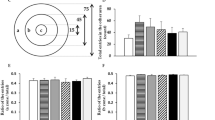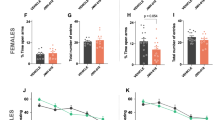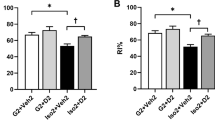Abstract
MARIJUANA and its active major ingredient, Δ-9-tetrahydrocan-nabinol (THC), reduce fighting among previously isolated mice1 and decrease preference for the side of a T-maze where they are rewarded by the opportunity to attack2. The degree of suppression of fighting behaviour seemed to be related to the cannabis resin content of the extract administered1. The behavioural effects which we reported2 could not be assessed for a THC dose-dependent relationship as some mice in the low-dosage group received faulty intravenous injections.
This is a preview of subscription content, access via your institution
Access options
Subscribe to this journal
Receive 51 print issues and online access
$199.00 per year
only $3.90 per issue
Buy this article
- Purchase on Springer Link
- Instant access to full article PDF
Prices may be subject to local taxes which are calculated during checkout
Similar content being viewed by others
References
Santos, M., Sampaio, M. R. P., Fernandes, N. S., and Carlini, E. A., Psychopharmacologia, 4, 437 (1966).
Kilbey, M., Johnson, K., and Fritchie, G. E., paper presented to the Seventeenth Annual Convention of the Southwestern Psychological Association, San Antonio, Texas (1971).
Valzelli, L., Proc. Fifth Intern. Cong. Collegium Internationale NeurO-Psycho-Pharmacologicium (edit. by Brill, H.), 781 (Excerpta Medica Foundation, Amsterdam, 1966).
Valzelli, L., Adv. Pharmacol. (edit. by Garattini, S., and Shore, P. A.), 5, 79 (1967).
Welch, B. L., and Welch, A. S., Commun. Behav. Biol., 1, 347 (1968).
Lycke, E., Modigh, K., and Roos, B. E., Experientia, 24, 951 (1969).
Maas, J. W., Science, 137, 621 (1962).
Tellegen, A., Horn, J. M., and Legrand, R., Psychon. Sci., 14, 104 (1969).
Fenimore, D. C., and Loy, P., J. Pharm. Pharmacol., 23, 310 (1971).
Ho, B. T., Taylor, D., Fritchie, G. E., Englert, L. F., and McIsaac, W. M., Brain Res. (in the press).
Welch, A. S., and Welch, B. L., Anal. Biochem., 30, 161 (1969).
Winer, B. J., Statistical Principles in Experimental Design (McGraw-Hill, New York, 1971).
Bolles, R. C., Theories of Motivation, 216 (Harper and Row, New York, 1967).
Kilbey, M. M., Farmer, R., McLendon, D., and Johnson, K., paper presented to the Nineteenth Annual Convention of the Southwestern Psychological Association, Oklahoma City Oklahoma (1972).
Bandler, jun., R. J., Brain Res., 20, 409 (1970).
Bose, B. C., Saife, A. Q., and Bhagwat, A. W., Arch. Intern. Pharmacodyn., 147, 291 (1964).
Brown, H., Psychopharmacologia, 21, 294 (1971).
Forbes, W. B., Olivetti, C. C., and Kilbey, M. M., paper presented to the Forty-fourth Annual Convention of the Midwestern Psychological Association, Cleveland, Ohio (1972).
Author information
Authors and Affiliations
Rights and permissions
About this article
Cite this article
KILBEY, M., FRITCHIE, G., MCLENDON, D. et al. Attack Behaviour in Mice inhibited by Δ-9-Tetrahydrocannabinol. Nature 238, 463–465 (1972). https://doi.org/10.1038/238463a0
Received:
Revised:
Issue Date:
DOI: https://doi.org/10.1038/238463a0
This article is cited by
-
Δ 1-tetrahydrocannabinol but not cannabidiol reduces contact and aggressive behavior of rats tested in dyadic encounters
Psychopharmacology (1984)
-
Behavioral and biochemical effects of chronic ? 9-tetrahydrocannabinol in rats
Psychopharmacology (1980)
-
Effects of cannabis resin on social behaviour in the laboratory mouse
Psychopharmacologia (1975)
-
Effects of hashish on isolation induced aggression in wild mice
Psychopharmacologia (1975)
-
Cannabis resin and sexual behaviour in the laboratory mouse
Psychopharmacologia (1975)
Comments
By submitting a comment you agree to abide by our Terms and Community Guidelines. If you find something abusive or that does not comply with our terms or guidelines please flag it as inappropriate.



